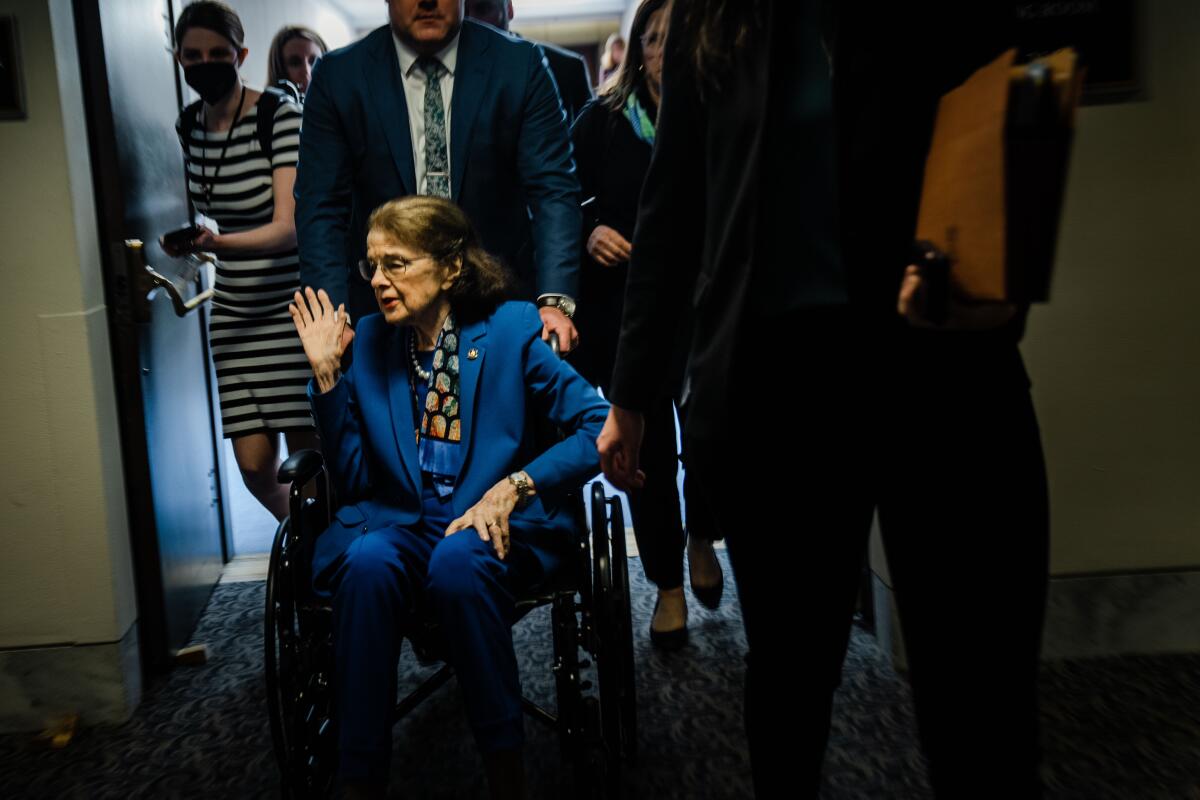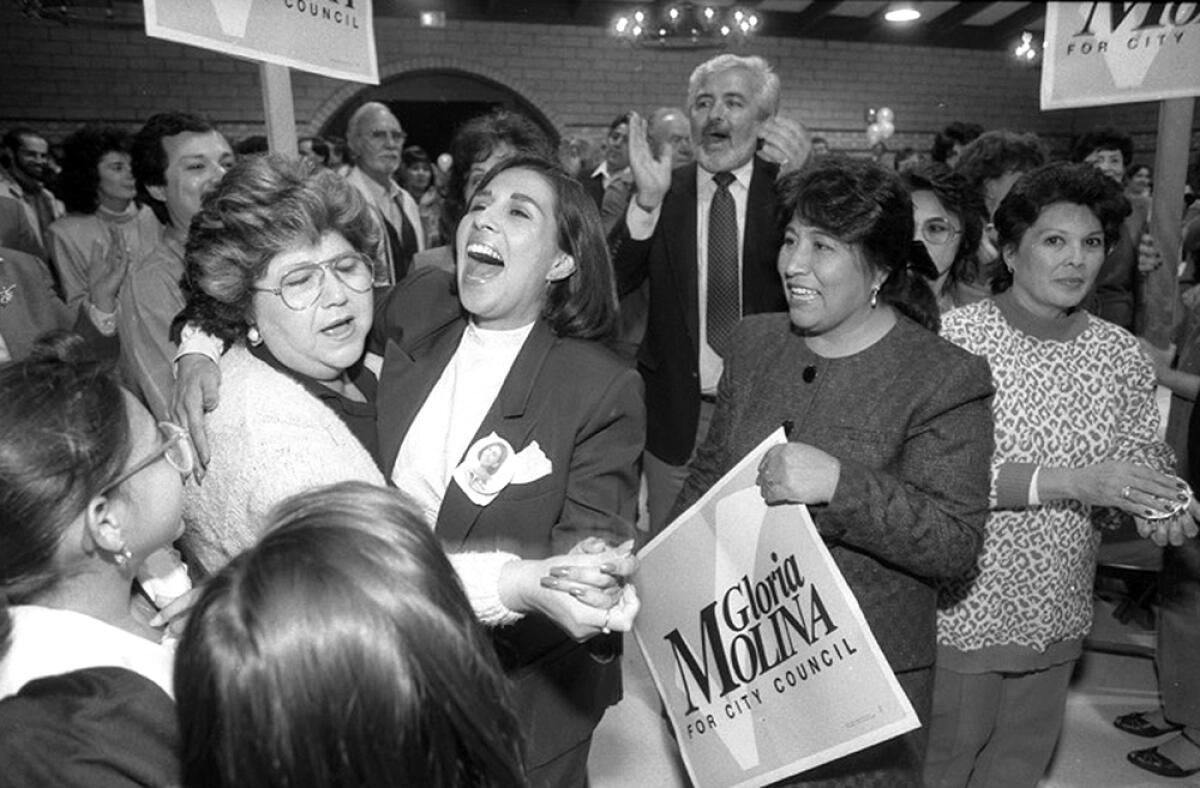California Politics: Feinstein’s brief exchange with the press

- Share via
SACRAMENTO — Sen. Dianne Feinstein has not said much publicly since returning to Washington, D.C., last week following a long stay at home in San Francisco while she was recovering from shingles.
But she did answer a few questions this week when Times reporter Benjamin Oreskes found her in the halls of the U.S. Capitol and asked about the well wishes she had received from her Senate colleagues since her return.
“I haven’t been gone,” she said. “I’ve been working.”
It was part of a brief but startling exchange that immediately drew interest around the country as concern continues to mount about Feinstein’s health and mental acuity. You can read more from their conversation in this article or hear a recording of it on this CNN report.
After returning to Washington last week, Feinstein cast critical votes to advance judicial nominees who lacked Republican support. And yet, Times political writer Seema Mehta and Oreskes report, among some California Democrats, Feinstein’s return did little to quell concern about her likely effectiveness in the Senate, heightened further by the Democrats’ razor-thin majority.
Susie Tompkins Buell, a major Democratic fundraiser based in San Francisco who has raised money for Feinstein in the past, told Mehta that she thinks Feinstein should resign:
“I know she likes being there, I know she’s a fighter. But I feel like for the bigger picture, for a better future for all of us, I think she should resign. It’s an act of honor to do that.”
Read the full article here: California Democrats further torn after seeing Sen. Feinstein’s return to Washington
I’m Laurel Rosenhall, The Times’ Sacramento bureau chief, here with your guide to the week’s news in California politics.
A suspenseful day in Sacramento
Today is the day hundreds of bills will die in the California Capitol by getting stuck in the mysterious “suspense file.”
Officially, the suspense file is a tool for legislative leaders to evaluate costly bills by weighing them against each other and deciding which ones are worthy of advancing to a vote by the full house. Unofficially, it’s used as a way for Democrats who control the Legislature to snuff out controversial bills with few fingerprints.
Sometimes the underlying cost is to blame. Other times, Democratic leaders use the suspense file to shield Democratic members from publicly taking a stance on dicey policy they may be too embarrassed to vote down. Often, bills turn to dust in the suspense file with no explanation at all.
As this newsletter hits your inbox, Times reporters will be sifting through hundreds of bills in the suspense file to see which ones died and which will advance to a floor vote. These are some that we’re watching:
- Assembly Bill 1138 to require most colleges to provide free transportation to and from a sexual assault forensic exam
- Senate Bill 600 to increase food benefits for low-income Californians
- AB 280 to limit the use of solitary confinement in prisons and jails
- Two bills to promote more housing construction with a labor standard that has divided construction unions
- SB 525 to make $25 the minimum wage for healthcare workers
- SB 287 to hold social media companies liable for promoting the illegal sale of fentanyl to youth and targeting them with content that could result in eating disorders or suicide
- SB 244 to make it easier to repair electronic devices
- AB 1207 to bar cannabis companies from selling products that resemble candy, soda and snacks that are attractive to kids
Check The Times’ website later today for our coverage.
Newsom’s plan to close a $31.5-billion budget hole
California’s estimated $31.5-billion budget deficit is forcing Gov. Gavin Newsom to begin reining in his progressive policy agenda, in a stark change from the surpluses that graced his first years in office, writes Times reporter Taryn Luna.
The governor’s $306.5-billion budget plan, which he detailed Friday, relies on money raised from bonds, taps into $450 million from the state’s safety-net reserve and renews a tax on managed care programs to support Medi-Cal while continuing plans to curtail increases for climate and transportation programs.
With tax collection expected to fall short of the money allocated for programs essential to millions of Californians, Newsom is taking a more conservative spending approach while trying to protect his marquee programs, including universal preschool and healthcare.
Luna and our policy reporters break down Newsom’s revised budget in this helpful article: What you need to know about Newsom’s plan to offset California’s $31.5-billion deficit
R.I.P. Gloria Molina

California lost a legend this week.
Gloria Molina, the daughter of working-class parents and an unapologetic Chicana who transformed the political landscape of Los Angeles, died Sunday night after a three-year battle with cancer, Times columnist Gustavo Arrellano wrote in this sweeping obituary that details her barrier-breaking career:
“Molina’s political life had been a series of firsts that inspired generations of women and Latinos to seek public office — the first Latina Assembly member in California, the first Latina on the Los Angeles City Council, the first Latina on the L.A. County Board of Supervisors.
Through her rise, Molina strode through L.A.’s corridors of power with an outsider’s skepticism and an insider’s know-how. A populist equally informed by the Chicano and feminist movements and the immigrant ethos of her parents, Molina’s battlegrounds were many.”
U.S. Sen. Alex Padilla (D-Calif.) remembered Molina as a leader who “was never, ever one to shy away from a tough fight.”
“From helping to build more affordable housing to fighting to expand public transportation, Gloria was a tireless advocate for Los Angeles’ Eastside,” Padilla said in a statement. “Each time we speak out today against the status quo and demand better from our government and our political leaders, we take a page from Gloria’s playbook — and California takes a step forward.”
Enjoying this newsletter? Consider subscribing to the Los Angeles Times
Your support helps us deliver the news that matters most. Become a subscriber.
Keeping up with California politics
Newsom and California lawmakers need to say where they stand on reparations for slavery
California voters are more liberal than Americans as a whole, so they may be more receptive to reparations than most of the nation. But columnist George Skelton writes that he thinks it will be a hard sell: “It will require strong backing from the governor, and so far he hasn’t said much.”
California created the nation’s only pension for aging boxers. But it’s failing many of them
California has the nation’s only state-administered retirement plan for boxers, which is meant to be a safety net for the sport’s most vulnerable. But more than a dozen boxers contacted by The Times said they too were unaware they were beneficiaries of the 40-year-old pension program. Many retired boxers said they could not recall ever receiving information from the California State Athletic Commission, which administers the plan, informing them that they qualified or how to apply.
Newsom seals unusual deal allowing farmworkers new way to unionize
California farmworkers can now unionize more easily after Gov. Gavin Newsom signed legislation Monday in the final step of an unusual compromise struck last year between the Democratic leader and union advocates.
Larry Elder fined for failing to disclose income during 2021 gubernatorial recall campaign
The GOP presidential candidate has agreed to pay a $2,000 fine for violating the state Political Reform Act while running for governor during the 2021 recall election, according to the Fair Political Practices Commission. Elder, who was a Los Angeles-based conservative talk-radio host before entering politics, failed to disclose earnings from 10 entities on his statement of economic interest, including Salem Media, Epoch Times and Turning Point USA.
Buried fees, cuts and some gems in Newsom’s budget, and thankfully no major tax increase
If you’re a California boater, Gov. Gavin Newsom wants you to pay the state more and get less in return. That’s one very small item tucked into the governor’s massive, revised $307-billion state budget proposal for the fiscal year starting July 1, writes columnist George Skelton.
Column: Kids are dying from fentanyl. More prison time for dealers won’t help
To understand why neither arrests nor needle exchanges will ever stop opioid overdoses, you need to know several things about why this drug epidemic is different from crack or heroin or anything that has come before, writes columnist Anita Chabria.
Stay in touch
Did someone forward you this? Sign up here to get California Politics in your inbox.
Until next time, send your comments, suggestions and news tips to capolitics@latimes.com.
Sign up for Essential California
The most important California stories and recommendations in your inbox every morning.
You may occasionally receive promotional content from the Los Angeles Times.







